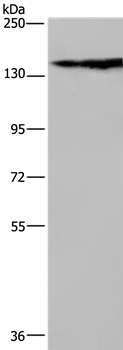
WB analysis of mouse brain lysate using GTX88324 NF-M antibody, Internal. Dilution : 0.03μg/ml Loading : 35μg protein in RIPA buffer
NF-M antibody, Internal
GTX88324
ApplicationsWestern Blot
Product group Antibodies
ReactivityHuman, Mouse
TargetNEFM
Overview
- SupplierGeneTex
- Product NameNF-M antibody, Internal
- Delivery Days Customer7
- Application Supplier NoteWB: 0.03-0.1microg/ml. *Optimal dilutions/concentrations should be determined by the researcher.Not tested in other applications.
- ApplicationsWestern Blot
- CertificationResearch Use Only
- ClonalityPolyclonal
- Concentration0.50 mg/ml
- ConjugateUnconjugated
- Gene ID4741
- Target nameNEFM
- Target descriptionneurofilament medium chain
- Target synonymsNEF3, NF-M, NFM, neurofilament medium polypeptide, 160 kDa neurofilament protein, neurofilament 3, neurofilament triplet M protein, neurofilament, medium polypeptide 150kDa, neurofilament-3 (150 kD medium)
- HostGoat
- IsotypeIgG
- Protein IDP07197
- Protein NameNeurofilament medium polypeptide
- Scientific DescriptionNeurofilaments are type IV intermediate filament heteropolymers composed of light, medium, and heavy chains. Neurofilaments comprise the axoskeleton and functionally maintain neuronal caliber. They may also play a role in intracellular transport to axons and dendrites. This gene encodes the medium neurofilament protein. This protein is commonly used as a biomarker of neuronal damage. Alternative splicing results in multiple transcript variants encoding distinct isoforms. [provided by RefSeq, Oct 2008]
- ReactivityHuman, Mouse
- Storage Instruction-20°C or -80°C,2°C to 8°C
- UNSPSC12352203






